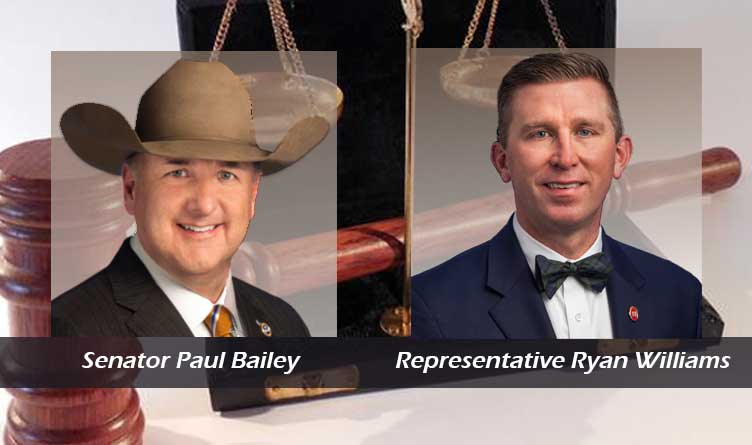Photo: Senator Paul Bailey of Sparta and Representative Ryan Williams of Cookeville
Photo Credit: capitol.tn.gov & Public Domain
Published April 20, 2021
The Tennessee Conservative Staff –
Tennessee lawmakers are seeking out a way to gain more control over representation of the state in federal courts.
Senator Paul Bailey of Sparta and Representative Ryan Williams of Cookeville are sponsoring SB350/HB506 which would allow the legislature to approve a new position that would have sole authority to represent the state when challenging the federal government in court.
That responsibility is currently held by the attorney general and reporter’s office. Currently, the state’s solicitor general is a part of that office, but the new legislation would move that position to answer straight to the Tennessee legislature. Lawmakers would elect the office-holder, who would serve for four years.
The legislation would also remove the authority to defend the state from the attorney general’s office, in both federal courts and all legal matters where a challenge is made to the state law. The bill gives the solicitor general the authority to determine whether the state should enter into joint lawsuits or not.
Senator Bailey believes this will allow them to more readily take action for the benefit of Tennesseans.
“This gives the legislature an opportunity to have a direct solicitor general that would advocate on behalf of the citizens of Tennessee,” Bailey said. “This will preserve our ability to pursue our standing in court these matters without seeking outside counsel.”
Tennessee is currently the only state that allows the state Supreme Court to appoint the attorney general. The office is not subordinate to the legislature.
Bailey sees that as something that needs to be changed,
“There’s been times in the past that the legislative branch wanted the attorney general to maybe enter into a pack with other states as far as filing lawsuits against the federal government,” he stated. “The attorney general said no, and the legislature basically didn’t have any say in it.”
According to Bailey, there have been several occasions when Attorney General Herbert Slatery refused to take on legal battles that the legislature wanted to see fought. The new solicitor general, however, would be “beholden” to elected legislators and would work for the people of Tennessee.
Not everyone is on board with the legislation, though. The attorney general’s office, state Democrats, and legal experts argue that the bill could actually be counterproductive and even unconstitutional.
“It strips all jurisdictions from the attorney general’s office to litigate in federal court,” said Jonathan Skrmetti, the state’s chief deputy attorney general. “You’d have split teams and it would create tremendous inefficiency to the detriment of the state’s legal interest.”
Skrmetti believes the plan could actually make the state’s legal representation more ineffective.
“In complex cases, there’s a lot of coordination between state court and federal court litigation,” he said. “This legislation would split the legal representation in Tennessee into two distinct halves and two offices, which would impede the ability to coordinate on that.”
A similar attempt was made to shift power away from the Attorney General in 2006. Then-Representative Frank Niceley of Strawberry Plains attempted to move to a voter-elected solicitor general.
Then-Attorney General Robert Cooper, Jr., a Democrat, issued a statement at the time stating that the push was unconstitutional.
Cooper stated that the bill “violates the Separation of Powers provisions of the Tennessee Constitution and unconstitutionally removes the constitutional authority of the Attorney General and Reporter.”
University of Memphis law professor Steve Mulroy also questions the constitutionality of the proposal. He argues that it would “steal” authority from the executive branch and reassign it to the legislature, a move that he feels may violate the “separation of powers”.
“The overall purpose of the separation of powers is to protect individual liberty by preventing too much concentration of power in any one branch,” he said. “So whenever one branch takes power away from another branch, then you raise at least a theoretical danger of over-concentration of power in one branch.”
House Republican leaders also acknowledged that care needs to be taken to avoid passing any unconstitutional laws.
“There are some constitutional issues that we’ll have to look into,” stated House Majority Leader William Lamberth. “We have to be very careful with a bill in that nature to make sure we don’t, literally, create something that will be unconstitutional.”
The bill has progressed out of the Senate State and Local Government Committee after further amendments were agreed upon. The bill will need to make it through two additional committees before making it to the Senate floor.





